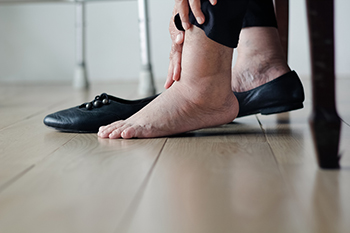
Swollen feet, also called edema of the feet, can occur from prolonged standing or walking and can be relieved by resting and elevating the legs. However, sometimes, swollen feet can result from a more serious underlying issue. These conditions often affect the movement of fluids within the body. As aging happens, valves within the veins of the legs that keep blood from being pulled down by gravity and pooling in leg veins may function less efficiently and cause swollen feet. Inflammation of the veins causes leg pain, as well as swollen feet. Deep-vein thrombosis is when blood clots form in the deep veins of the legs and block blood from the legs from returning to the heart, which will also cause swollen feet. When one experiences heart failure, the heart is not pumping as it should, and again, blood in the leg veins pools there instead of being pumped back to the heart. Since these and other contributing health conditions can be serious, it is suggested that if your feet are chronically swollen, you see a podiatrist who can diagnose the problem and get treatment underway.
Swollen feet can be a sign of an underlying condition. If you have any concerns, contact Howard Abramsohn, DPM of Ambulatory Foot and Ankle Associates, LLC. Our doctor can provide the care you need to keep you pain-free and on your feet.
Swollen feet are a common ailment among pregnant women and people who stand or sit for extended periods. Aging may increase the possibility of swollen feet and patients who are obese often notice when their feet are swelling too. There may be medical reasons why swollen feet occur:
- Phlebitis - A condition that causes the veins to become inflamed and can also cause leg pain.
- Liver disease - This may lead to low blood levels of albumin which is a protein. This can cause fluid in the blood to pass into the tissues and several areas of the body can become swollen.
- Heart failure - When the heart doesn’t pump properly the blood that is normally pumped back to the heart can pool in the veins of the legs causing swollen feet.
- Kidney disease - One of the main functions of the kidneys is releasing excess fluid in the body. This type of condition can make it difficult for the kidneys to function properly, and as a result the feet may become swollen.
- Deep-vein thrombosis (DVT)- This is a serious condition where blood clots form in the veins of the legs. They can block the return of blood from the legs to the heart which may cause the feet to swell. It is important to be treated by a podiatrist if this condition is present.
Swollen feet can also be caused by bone and tendon conditions, including fractures, arthritis, and tendinitis. Additionally, there may be skin and toenail conditions and an infection may cause the feet to swell. Patients who take medicine to treat high blood pressure may be prone to getting swollen feet.
Many patients elevate their feet to help relieve the swelling and this is generally a temporary remedy. When a podiatrist is consulted the reason behind the swelling can be uncovered and subsequently treated.
If you have any questions please feel free to contact our office located in Mt Laurel Township, NJ . We offer the newest diagnostic tools and technology to treat your foot and ankle needs.
